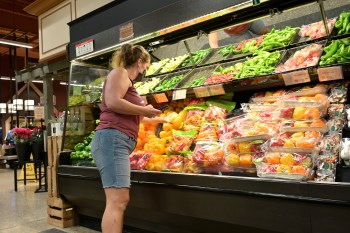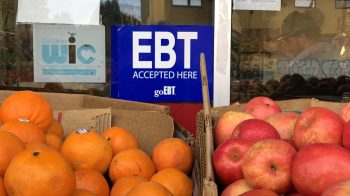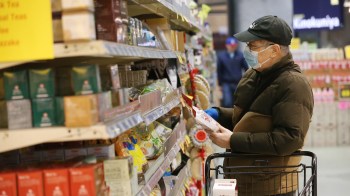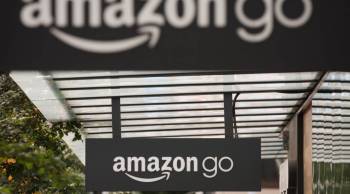Online groceries for all, including food stamp users
David Brancaccio: Today as part of our coverage of Wealth and Poverty issues, we’ll explore an inequality when it comes food stamps. In this case where people can use them. For instance, groceries bought online can’t be paid for with food stamps. The U.S. Agriculture Department just announced it’ll pilot a program with one New York grocery store to allow a small number of food stamp recipients to buy groceries online. But Congress would have to make this nationwide.
Jason Ackerman is the CEO of the grocery store that is piloting the program — FreshDirect. Good morning, Mr. Ackerman.
Jason Ackerman: Good morning, David.
Brancaccio: So you’re calling for what — food stamp recipients to be able to buy groceries online?
Ackerman: That’s correct.
Brancaccio: Why?
Ackerman: Well currently, food stamps, you cannot transact online. The EBT program is not modernized, so if you’re a food stamp recipient, you can’t buy online.
Brancaccio: I have to tell you, though, that buying groceries online seems like an upscale sort of thing. You think it could work for this, a different market segment like this?
Ackerman: We do. In fact, if you look at a lot of the food stamp recipients are working moms, and they’re trying balance a life of raising their kids and working. And I think that convenience is valuable, and eating nutritiously is valuable. So we do think there’s a marketplace for it.
Brancaccio: Now, many lower-income people will have trouble with fast Internet access. Could that be a barrier here?
Ackerman: It’s a bit of a misnomer that low-incomers do not have Internet access. I think it’s getting stronger. It’s certainly not the entire segment of the population. But no, we feel pretty good that the access is there.
Brancaccio: What motivates you here? Is this about being able to have even more customers, bigger markets?
Ackerman: In a small way. But I think largely, FreshDirect really believes it’s part of our corporate obligation to be able to create access of nutritious foods for all income levels. I think when you look at the lower-income parts of New York, there is a real obesity problem and diabetes problem. And if we can be a part of the solution by creating access of quality, nutritious foods — which is lacking in those areas — then we really want to do our part.
Brancaccio: And you’re not just saying that. There is evidence, right, that shows that in some tough neighborhoods, you can’t just easily walk to a place to find fresh produce?
Ackerman: No, you can’t. You can maybe find at the local bodega, but it’s also likely not as fresh, and it could quite often be very expensive. If you do go into the Bronx, for example, and talk to the community, they really have a hard time accessing fresh foods. And this could make it more accessible for everybody.
Brancaccio: You’re going to put these local bodegas out of business?
Ackerman: Well I think there’s room in the market for everybody, but hopefully people will eat more nutritiously.
Brancaccio: Jason Ackerman, CEO of Fresh Direct. Thank you very much.
Ackerman: Thank you, David. Glad to be here.
There’s a lot happening in the world. Through it all, Marketplace is here for you.
You rely on Marketplace to break down the world’s events and tell you how it affects you in a fact-based, approachable way. We rely on your financial support to keep making that possible.
Your donation today powers the independent journalism that you rely on. For just $5/month, you can help sustain Marketplace so we can keep reporting on the things that matter to you.


















